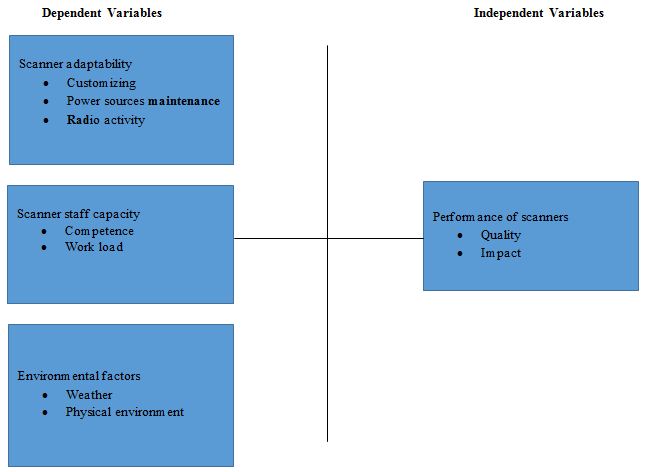Effects of Zambia Revenue Authority Non-Intrusive Scanner Machines on Tax Compliance in Zambia: A Case of the Kapiri Mposhi Weigh Bridge
DOI:
https://doi.org/10.5281/zenodo.10805690Keywords:
nonintrusive scanners, revenues, tax compliance, zambia revenue authority, quality, impactAbstract
The purpose of this study was to determine the effects of Zambia revenue Authority Non-Intrusive Scanner machines on tax compliance in Zambia-Case study Kapiri Mposhi weigh Bride. It was against this background that this study was conducted to determine the effects of Zambia revenue Authority Non-Intrusive Scanner machines on tax compliance in Zambia-Case study Kapiri Mposhi weigh Bride. The study adopted a descriptive case study design and targeted 110 respondents composed of 10 custom officers and 100 passersby trucks at kapiri weigh bride. The results of the study revealed that out of the 110 respondents from this research, 77 respondents which represented 77% responded that, scanner machines have great impact on revenue collection. The association between non-intrusive scanners and revenue increase was found to be significant with p values (0.027<0.05). There was also a difference in the revenues collected before and after, and since the revenues collected after the introduction of non-intrusive scanners machines has positive coefficient in relation to the revenues collected before the introduction of non-intrusive scanners machines, it was then concluded that non-intrusive scanners have a positive effect on total revenue collected.
The findings pointed out that non-intrusive scanner machines are effective when there is consistency in their operation while scanner downtime was found to affect revenue collection strongly on the negative way. Despite some inconsistencies the results obtained from this study revealed that many taxpayers want the non-intrusive scanner machines to continue being used as the solution to the delayed traffic at the weigh bridge. It was recommended that the number of scanners to be increased to cover more trucks as well as reducing congestion at the scanning unit and delays.
Downloads
References
Allport, G. W. (1935). Attitudes. In: C. Murchison (ed.). Handbook of social psychology worcester, mass: Clark University Press.
Ball, S.J (1994). Education reform. Buckingham: University Press.
Berenson, M. P. (2007). Becoming citizens: Attitudes towards paying tax-compliance in Poland, Russia and Ukraine. April 27. Available at: (http://siteresources.worldbank.org/INTACDESL02007/Resources/Brenson.PDF). [Accessed 21 July 2010].
Burkey, S. (1993). People first: A guide to self-reliant, participatory rural development. New York: Zed Books.
Chilisa, B., & Preece, J. (2005). Research methods for adult educators in Africa. Gaborone: UNESCO Institute for Education.
Cross, K. P. (1981). Adults as learners. San Francisco: Jossey-Bass. Djokotoe, E.
Duke, C. (1992). What kind of adult education helps democracy’ in DVY/adult education and development. 39, 187-190.
Dye, T. M. (1978). Understanding public policy. Englewood cliffs: Prentice hall.
Fjeldstad, O. (1996). To pay or not to pay: Citizen’s views on taxation in local authorities of Tanzania. Bergen: Chr. Michelson Institute.
Freire, P. (1989). Pedagogy of the oppressed. New York: Continuum.
Gluckman, M. (1963). The ideas in barotse jurisprudence. Manchester: Manchester University Press.
Goode, R. (1951). Some economic aspects of tax administration. In: R. Bird & O. Oldman (eds.). Taxation in developing countries, pp.476-481.
GRZ-National authorizing officer of the European development fund. (1996). The development of a master plan to rehabilitate and rationalize the urban markets of Lusaka, Kitwe and Ndola. Final Report 7 ACP ZA 076. Lusaka: Ministry of Local Government & Housing.
GRZ-Ministry of finance & national planning (2008). Engaging stakeholders in the budget process - Report. Lusaka: MoF Publications.

Downloads
Published
How to Cite
Issue
Section
License
Copyright (c) 2024 Japau Banda, Dr. Chaste Nsama

This work is licensed under a Creative Commons Attribution 4.0 International License.
Research Articles in 'Management Journal for Advanced Research' are Open Access articles published under the Creative Commons CC BY License Creative Commons Attribution 4.0 International License http://creativecommons.org/licenses/by/4.0/. This license allows you to share – copy and redistribute the material in any medium or format. Adapt – remix, transform, and build upon the material for any purpose, even commercially.









